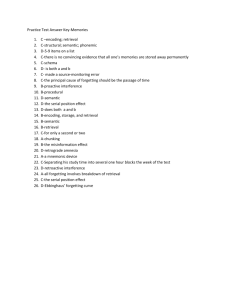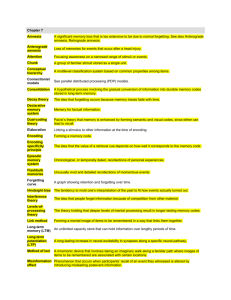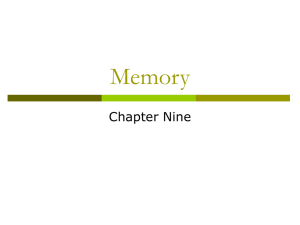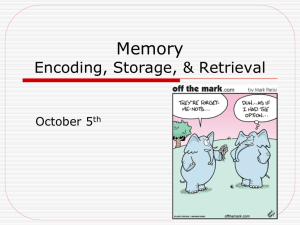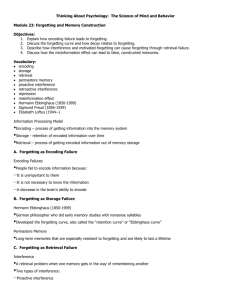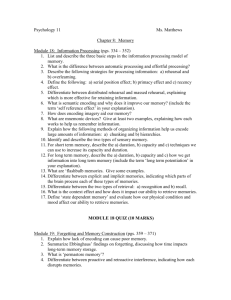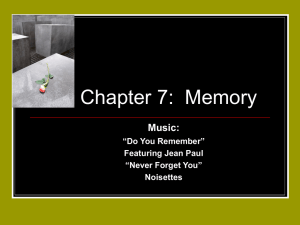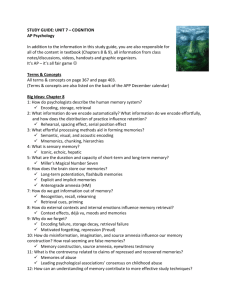Forgetting, Memory Construction, and Improving Memory
advertisement
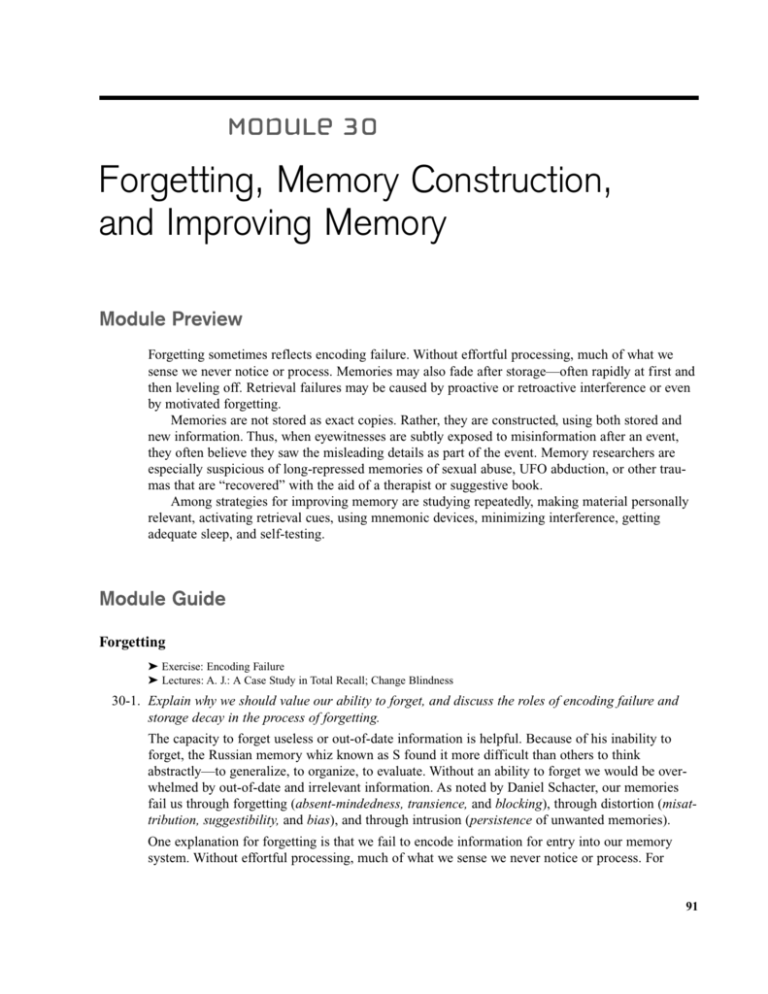
Forgetting, Memory Construction, and Improving Memory Forgetting sometimes reflects encoding failure. Without effortful processing, much of what we sense we never notice or process. Memories may also fade after storage—often rapidly at first and then leveling off. Retrieval failures may be caused by proactive or retroactive interference or even by motivated forgetting. Memories are not stored as exact copies. Rather, they are constructed, using both stored and new information. Thus, when eyewitnesses are subtly exposed to misinformation after an event, they often believe they saw the misleading details as part of the event. Memory researchers are especially suspicious of long-repressed memories of sexual abuse, UFO abduction, or other traumas that are “recovered” with the aid of a therapist or suggestive book. Among strategies for improving memory are studying repeatedly, making material personally relevant, activating retrieval cues, using mnemonic devices, minimizing interference, getting adequate sleep, and self-testing. Forgetting ➤ Exercise: Encoding Failure ➤ Lectures: A. J.: A Case Study in Total Recall; Change Blindness 30-1. Explain why we should value our ability to forget, and discuss the roles of encoding failure and storage decay in the process of forgetting. The capacity to forget useless or out-of-date information is helpful. Because of his inability to forget, the Russian memory whiz known as S found it more difficult than others to think abstractly—to generalize, to organize, to evaluate. Without an ability to forget we would be overwhelmed by out-of-date and irrelevant information. As noted by Daniel Schacter, our memories fail us through forgetting (absent-mindedness, transience, and blocking), through distortion (misattribution, suggestibility, and bias), and through intrusion (persistence of unwanted memories). One explanation for forgetting is that we fail to encode information for entry into our memory system. Without effortful processing, much of what we sense we never notice or process. For 91 92 Module 30 Forgetting, Memory Construction, and Improving Memory example, most people in the United States have looked at thousands of pennies. However, when tested on specific features, they have difficulty recognizing the real thing. Memories may fade after storage. From his research on learning and retention, Ebbinghaus found that forgetting occurs rapidly at first, then levels off. This principle became known as the forgetting curve. Storage decay may reflect a gradual fading of the physical memory trace. Another possible explanation is that we simply can’t retrieve the information. ➤ ➤ ➤ ➤ ➤ Exercises: The Tip-of-the-Tongue Phenomenon and Capital Cities; Repression or Inadequate Retrieval Cues? Lecture: Suppressed Memory Project: A Forgetting Journal Project/Exercise: Earliest Recollections PsychSim 5: Forgetting 30-2. Explain what is meant by retrieval failure, and discuss the effects of interference and motivated forgetting on retrieval. Retrieval failure can occur if we have too few cues to summon information from long-term memory. It may also happen when old and new information compete for retrieval. In proactive interference, something we learned in the past interferes with our ability to recall something we have recently learned. In retroactive interference, something we have recently learned interferes with something we learned in the past. With his concept of repression, Sigmund Freud proposed that our memories are self-censoring. To protect our self-concepts and to minimize anxiety, we may block from consciousness painful memories. In Freud’s view, this motivated forgetting submerges memories but leaves them available for later retrieval under the right conditions. Increasing numbers of memory researchers think repression rarely, if ever, occurs. More typically, we have trouble forgetting traumatic experiences. Memory Construction ➤ Lectures: Misremembering the Causes of Behavior; The Misinformation Effect; True Photos and False Memories; False Memories Surrounding the Iraq War; Source Amnesia ➤ Exercises: Eyewitness Testimony—What Have We Learned?; Creating a False Memory ➤ Project: Constructive Memory ➤ PsychSim 5: Trusting Your Memory ➤ Video: Segment 17 of the Scientific American Frontiers Series, 2nd ed.: True or False? ➤ Instructor Video Tool Kit: Creating False Memories: A Laboratory Study 30-3. Explain how misinformation, imagination, and source amnesia can distort our memory of an event, and discuss why it is difficult to distinguish between true and false memories. Memories are not stored as exact copies, and they certainly are not retrieved as such. Rather, we construct our memories, using both stored and new information. In many experiments around the world, people have witnessed an event, received or not received misleading information about it, and then taken a memory test. The repeated result is a misinformation effect: After exposure to subtle misinformation, many people misremember. Asking leading questions can plant false memories. As people recount an experience, they fill in their memory gaps with plausible guesses. Other vivid retellings may also implant false memories. Even repeatedly imagining and rehearsing nonexistent events can create false memories, called imagination inflation. Our memory for the source of an event is particularly frail. In source amnesia, we attribute to the wrong source an event that we have experienced, heard about, read about, or imagined. Thus, we may recognize someone but have no idea where we have seen the person. Or we imagine or dream an event and later are uncertain whether it actually happened. Because memory involves reconstruction as well as reproduction, we are unable to tell whether a memory is real by how real it feels. False memories created by suggested misinformation and Module 30 Forgetting, Memory Construction, and Improving Memory 93 misattributed sources may feel as real as true memories and may be very persistent. Just as perceptual illusions may seem like real perceptions, false memories may feel like real memories. ➤ Lectures: Repressed Memories of Abuse; The Misinformation Effect and False Confessions ➤ Exercise: The Heartland Forgiveness Scale (HFS) ➤ Instructor Video Tool Kit: Repression: Reality or Myth? 30-4. Discuss whether young children’s eyewitness reports are reliable and the controversy over reports of repressed and recovered memories. Preschool children are particularly sensitive to suggestion, and their recollections of sexual abuse may be prone to error. When researchers have used suggestive interviewing techniques, they have found that most preschoolers and many older children can be induced to report false events. However, even young children can accurately recall events if a neutral person asks about their experiences in neutral words they can understand and uses less suggestive, more effective techniques. Innocent people have been falsely convicted of abuse that never happened, and true abusers have used the controversy over recovered memories to avoid punishment. Forgetting of isolated past events, both negative and positive, is an ordinary part of life. Cued by a remark or an experience, we may later recover a memory. Controversy, however, focuses on whether the unconscious mind forcibly represses painful experiences and whether they can be retrieved by therapist-aided techniques. Memories “recovered” under hypnosis or drugs are especially unreliable, as are memories of things happening before age 3. Traumatic experiences are usually vividly remembered, not banished into an active but inaccessible unconscious. Improving Memory ➤ Lecture: Making Doctors’ Instructions More Memorable 30-5. Explain how an understanding of memory can contribute to effective study techniques. The psychology of memory suggests several effective study strategies. These include studying repeatedly by using spaced practice; making new material personally meaningful by relating it to what is already known; mentally re-creating the contexts and moods in which the original learning occurred in order to activate retrieval cues; using mnemonic devices; minimizing interference, for example, by studying just before sleeping; sleeping more; and testing your own knowledge both to rehearse it and to determine what must still be learned.
